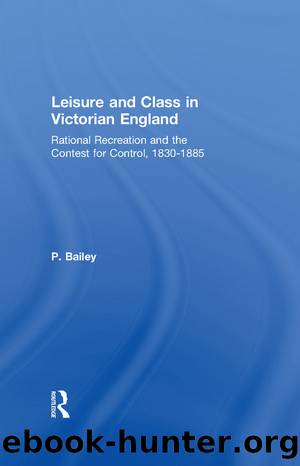Leisure and Class in Victorian England by Peter Bailey

Author:Peter Bailey [Bailey, Peter]
Language: eng
Format: epub
Tags: History, General
ISBN: 9781317973614
Google: od2xAgAAQBAJ
Publisher: Routledge
Published: 2014-01-14T01:21:59+00:00
Though he was apprehensive at the dangers that the popularity of athletic sports posed to intellectual life at the universities, Stephen allowed that they met the need for physical recreation (âsome good stupid amusementâ) for the urban middle classes. Some traditional prescriptions were in any case now simply impractical â as John Morley pointed out, âthe persistence of doctors in urging horse exercise is, to the majority, absurd.â (8) Among this majority were the clerks and shopmen, whose work, according to âThe Timesâ, demanded only the slightest of physiques: âCivilisation wants light men â they don't want six feet to vault over counters and run up steps at a draper's shop.â At the time of the Crimean War the paper warned that the nation could not rely upon such insubstantial material to win future Inkermans, unless nimbleness was reinforced with muscle and stamina. Thirty years later, in a survey of modern English sport, Frederick Gale concluded that only organised games had saved the âcounter skippersâ from effeminacy. (9) The working classes were never in danger of effeminacy, but city life blighted their health to an extent which alarmed doctors and disappointed recruiting sergeants. William Hardwicke, medical officer for health in Paddington in the 1860s, urged the case for state promotion of games and gymnastic exercises to halt this degeneration, and Lord Brabazon, chairman of the Gardens and Playgrounds Association, moved the same case twenty years later on the evÃdence that nearly half the recruits seeking enlistment in the services were rejected for physical incapacity. (10)
Physical recreation received further endorsement from major contemporary figures. We have seen in a previous chapter how Charles Kingsley imparted a spiritual gloss to sport and bodily exercise. His emphasis upon their necessary practice as a duty to one's country became more insistent after his conversion to Darwinism (an ideology whose popularity increased the general concern over national health). Another Darwinian, Herbert Spencer, maintained that âthe contests of commerce are in part determined by the bodily endurance of the producers.â (11)
Under the influence of such teachings sport became a medium for training the young to meet with the diverse challenges of a naturally harsh and competitive world â âGamesâ, declared the physician to Rugby School, produce a just ambition to excel in every phase of the battle of life.â (12) The language of games became the language of adventure and the highest endeavour, designed to sustain the young under fire, whether from fast bowlers or insurgent tribesmen. A Scottish divine expressed his delight at a youthful game of cricket in the following terms: (13)
How I love to mark the quick, watchful glance of the eye as the ball comes speeding on which will decide for âour Clubâ the honour of the day, and to mark on the faces of those who go out, the look which was on that of Fran's I as he wrote to his mother after the battle of Pavia, âTout est perdu hormis l'honneur.â
Download
This site does not store any files on its server. We only index and link to content provided by other sites. Please contact the content providers to delete copyright contents if any and email us, we'll remove relevant links or contents immediately.
| General | Channel Islands |
| England | Northern Ireland |
| Scotland | Wales |
Room 212 by Kate Stewart(5102)
The Crown by Robert Lacey(4799)
Endurance: Shackleton's Incredible Voyage by Alfred Lansing(4749)
The Iron Duke by The Iron Duke(4345)
The Rape of Nanking by Iris Chang(4194)
Joan of Arc by Mary Gordon(4091)
Killing England by Bill O'Reilly(3989)
Say Nothing by Patrick Radden Keefe(3974)
I'll Give You the Sun by Jandy Nelson(3424)
Shadow of Night by Deborah Harkness(3352)
Hitler's Monsters by Eric Kurlander(3327)
Mary, Queen of Scots, and the Murder of Lord Darnley by Alison Weir(3194)
Blood and Sand by Alex Von Tunzelmann(3188)
Eleanor & Park by Rainbow Rowell(3147)
Darkest Hour by Anthony McCarten(3117)
Margaret Thatcher: The Autobiography by Thatcher Margaret(3072)
Book of Life by Deborah Harkness(2921)
Red Famine: Stalin's War on Ukraine by Anne Applebaum(2916)
The One Memory of Flora Banks by Emily Barr(2853)
